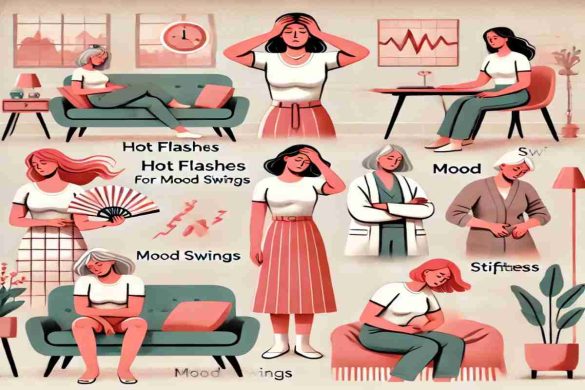There are many potential symptoms of menopause. They can affect your physical, mental, and emotional health in a variety of ways. Even if you do your homework about menopause and its symptoms, what you experience will be unique. Not all hot flashes are alike. Not all mood swings are either.
Trying to expect the unexpected seems counterintuitive. Unexpected symptoms, by nature, may be impossible to anticipate. How you handle them when they occur is what’s important. Here are a few ways you can.
Crush Chronic UTIs
If you ever experienced a urinary tract infection, you know how painful, uncomfortable, and utterly inconvenient it is. Estrogen, the hormonal hallmark of women’s health, is one element that keeps the urinary tract healthy. Lose the estrogen and you lose that protection.
UTIs during menopause may not be a once-in-awhile occurrence. They can become chronic, and that means you’re constantly dealing with their unpleasant symptoms. As is true with any chronic condition, this can cause anxiety, depression, embarrassment, and even more serious health problems.
If chronic UTI shows up on your menopausal doorstep, try adding a UTI supplement to your daily regimen. Supplements are designed to keep bad bacteria from clinging to the bladder wall. That helps you flush harmful bacteria out of your system every time you urinate. And that can help keep you on the right track despite the estrogen loss.
Cool the Burn
Hot flashes may be the most infamous of all menopause symptoms. Turns out that estrogen is a major player in regulating body temperature. And when it’s gone, other hormones rush to the hypothalamus in its stead, ironically signaling the brain to raise the heat to lower it.
Hot flashes by day are night sweats by night. The latter usually involves more rampant sweating but even worse, they disrupt sleep. Those barriers to quality sleep lead to all kinds of symptoms, including depression, anxiety, and increased risk of cardiac problems, diabetes, and obesity.
Layering in breathable and moisture-wicking fabrics is a good strategy here. Once an episode passes, you could experience chills, so you’ll want to put some clothing back on. To help at night, layer the bed in cotton, silks, stain, and linen. And whatever time of day you heat up, have a fan at the ready to cool yourself down.
Change Your Diet
That old saying that you are what you eat is true, especially when what you are is menopausal. That’s why what you eat and drink can help you tackle more than one symptom you might encounter during this stage in life. Hot flashes, weight gain, sleep disturbances, and skin and vaginal dryness might all benefit from conscientious consumption.
Avoiding spicy, sugary, and high-fat foods at night could reduce the frequency and severity of night sweats. Adhering to a diet of whole grains, fresh vegetables and fruits, legumes, and leafy greens can help reduce the visceral fat that accumulates around the menopausal middle. Ramping up water consumption, along with a moisturizing regimen, can help reduce flaky skin, wrinkles, fine lines, and vaginal dryness.
No matter who you are, your body’s ability to process alcohol decreases with age, so cut back or avoid it altogether. Your sleep quality and depression might improve. Plus, you’ll be developing habits that contribute to overall healthy aging.
Exercise Differently
The aforementioned visceral fat around your middle is commonly referred to as “menopause belly.” Once it’s there, it can be extremely difficult to get rid of it. But it’s not impossible, especially if you understand some basic science.
Women and men both lose muscle mass as they age, which invites the formation of fat. For women, it’s often worse because their loss of estrogen is replaced by testosterone production, which deposits that fat in the midsection. Getting rid of it requires a different approach to an exercise routine that might have served you well for decades.
Cardio is still recommended for overall health, but during menopause, muscle-building exercise becomes as important. Incorporate high-intensity workouts into your routine, with plenty of weightlifting and calisthenics like pushups, sit-ups and squats. That’s what will attack the belly and boost that seemingly elusive metabolism.
Build a Village
There is a reason why support groups seem to work. They bring together people who share a condition or circumstance and give them space to talk about it. Because they share what’s going on, they find empathy, experience, knowledge, and hope.
During menopause, you can find support in many places if you’re willing to open up and seek them out. Find a healthcare provider who’s going through or has emerged from menopause to discuss your health. Surround yourself with women at work and in social settings who are going through this stage in life. You can even spend time at a menopause retreat, connecting with other women dealing with the same issues.
There is strength in numbers, so come out into the open and build your village. You will find you aren’t alone in your struggles. And you might just find some answers you’ve been looking for.
Expect the Unexpected
Every woman experiences menopause differently, so you can’t predict what your specific symptoms will be. But you can be ready to handle whatever symptoms you have when they arise. Brush up on these interventions now and you may be able to hit back at menopause where it least expects it.


